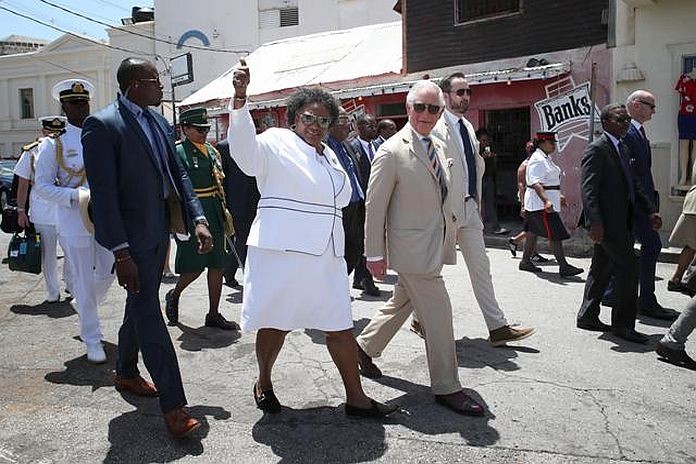By Oren Gruenbaum
Little England, as Barbados is often known, will swap Queen Elizabeth for Dame Sandra this month, when the Caribbean nation becomes a republic under a homegrown head of state. It marks the fulfilment of a pledge last year by the prime minister, Mia Mottley, to give the island a Barbadian president.
Sandra Mason, who as governor-general was the Queen’s representative on the island, was elected in a joint sitting of the House of Assembly and Senate on 20 October. Mottley called it a ‘seminal moment’ for Barbadians to ‘claim our full destiny’, the Government Information Service reported. She praised the president-elect, who was the country’s first female barrister and appeal court judge, as a female role model who embodied the nation’s values.
After her Labour Party swept all 30 parliamentary seats and 73 percent of the vote in the 2018 election, Mottley faced little opposition in the move to a republic – Gary Younge, in a Vogue profile, called her a ‘transformational steam train’. But Mason’s election was not entirely consensual: Caswell Franklyn, an opposition senator, walked out of parliament in protest at what he called the ‘farce’ of not drawing up a republican constitution. Devaron Bruce, a politics student at the University of the West Indies (UWI) in Barbados, criticised citizens’ lack of input: ‘We want to know what the criteria are to be president, what the limitations are.’
Writing in the Round Table, Ronnie Yearwood and Cynthia Barrow-Giles, both UWI academics, called it ‘merely seeking to swap one ceremonial head of state with another’ and bemoaned ‘patchy’ media coverage, the ‘deafening silence’ of politicians, the lack of any republican movement and a disinterested youth. They said becoming a republic should have a popular mandate via a referendum.
Prince Charles will attend the ceremony on 30 November – the 55th anniversary of Barbados’s independence. ‘Charles’s presence is quite significant,’ Prof Philip Murphy, director of the Institute of Commonwealth Studies, told the Times. ‘Its purpose will probably be to stress the fact that Barbados will remain in the Commonwealth even after the transition, and to emphasise Charles’s status as the Queen’s successor as head of the Commonwealth.’ For the Queen, Barbados’s move is likely to be ‘another melancholy sign of how quickly the world is changing’, the New York Times (NYT) said. Nevertheless, she will remain head of state in 15 Commonwealth countries, most of which are in the Caribbean (Jamaica, St Vincent and the Grenadines, Antigua and Barbuda, Belize, Grenada, St Kitts and Nevis, Saint Lucia, and The Bahamas).
But when Mottley pledged last year that Barbados was set to ‘fully leave our colonial past behind’, she was giving voice to a groundswell of republican thinking that has been building across the region for years. In Saint Vincent and the Grenadines, it was put to a referendum in 2009 but only 43% of voters backed the move to a republic. Saint Lucia’s 2011 Constitutional Reform Commission recommended: ‘The governor-general should be replaced by a ceremonial president with similar powers and responsibilities.’ However, the report was only debated in the island’s parliament in 2015 and nothing came of the proposal. Congratulating Mottley on the success of her reform, Grenada’s National Democratic Congress party said: ‘In 2016, when Grenada was undertaking the first attempt at reforming the constitution through a national referendum, it was one of the issues which came up in a lot of public consultations.’
The leader of Jamaica’s opposition People’s National Party, Mark Golding, told the Independent in July: ‘I don’t think one could argue that we are fully independent when our head of state is somebody who lives on the other side of the Atlantic Ocean and isn’t a Jamaican.’ Noting that the prime minister, Andrew Holness, had promised a non-executive president in 2016, an editorial in the Jamaica Gleaner declared: ‘It remains a cruel irony that more than half a century after the island’s independence, the aged matriarch of a dysfunctional British family, who looks nothing like the vast majority of Jamaicans, is the symbol of this country’s deepest aspirations … The majority of Jamaicans agree that this should change, and there is cross-party consensus.’ The Round Table’s Prof Richard Drayton told the NYT last year: ‘Barbados could be a tipping point. If Barbados is successful in taking this step, it would inspire other countries to do the same.’
Mottley said becoming a republic was a ‘springboard that we as a nation need in order to confront a completely different reality’. It was not a ‘rejection’ of the Queen personally, she said, but ‘an assertion that it must be available to every Barbadian boy and girl to aspire to be the head of state of this nation. It is not just legal, it’s also symbolic.’ The prime minister may also be clearing the way for the Caribbean regional bloc, CARICOM, to push harder in its claims for reparations for slavery, as outlined in its 10-point plan. She has been a leading voice in demands for ‘reparatory justice’ from the European states enriched by ‘illicit gains from a crime against humanity’. Calling for a ‘Caribbean Marshall Plan’ last year, she said reparations were ‘an idea whose time has come’. Prof Sir Hilary Beckles, chair of the CARICOM Reparations Commission, explicitly linked it to decolonisation as ‘phase two of the independence process’.
‘Removing the Queen as our head of state and reparations for slavery are … fundamental to our identity,’ Golding declared. For Prof Carolyn Cooper, of the UWI in Jamaica, retaining a hereditary head of state ‘implies acceptance of the monarchy’s right to rule’. She added: ‘This diminishes our claim for reparations. Seeking reparations from your head of state is ludicrous; the reparations imperative is organically related to fracturing the ties with the British monarchy.’
This article was originally published by The Round Table, The Commonwealth Journal of International Affairs November 18, 2021.





